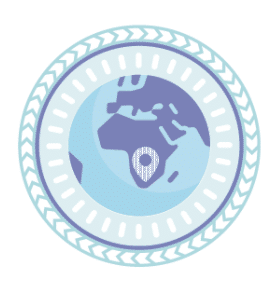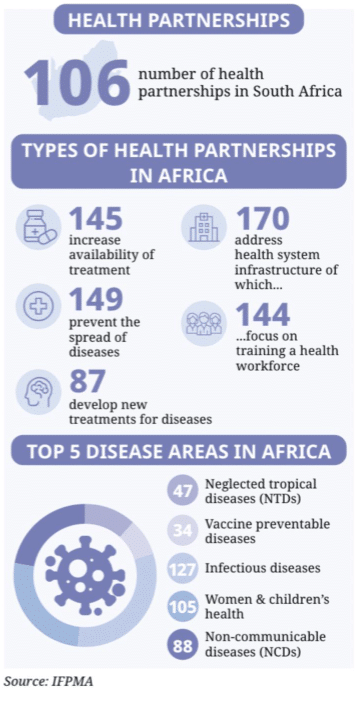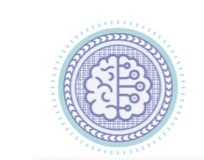“The only positive thing of the pandemic is that it has brought together different actors in society, ones that wouldn’t normally work together, figuring out it is possible to work together and is something I am hugely proud of.” Jonathan Broomberg, CEO of Vitality Health International
The following article is an edited online version . To download the full report click here. For access to the exclusive interviews click here.
“The next few years will be a revolution,” says Emma Knox on the power of collaboration: during COVID-19, as the Health Workstream Lead for B4SA, she spearheaded partnerships to procure 2 billion rand (133 million USD) of PPE and medical equipment, bringing together major donors in the Solidarity Fund. Many companies like RMB, PWC, Deloitte, AB Inbev and Discovery, who offered volunteers and other resources, were proof that for Health Stewards in 2021 and beyond, collaboration is the name of the game. But if collaboration between governments, agencies, associations, and businesses—even competitors—is the way forward, will there ever be the same coordinated effort for healthcare as there is for Climate Change, as demonstrated in the recent COP26 Climate Change Conference?
Come together, right now — Overseas
One recent sign toward global coordination is Merck granting a royalty-free license for its groundbreaking COVID-19 pill to the United Nations-backed nonprofit Medicines Patent Pool.
It’s a novel idea in drug development: instead of a system built to benefit shareholders, a new “open-source” platform could borrow best practices from software like Linux and Firefox and potentially energize the race to end COVID-19. Merck’s initiative subsidizes access for 105 countries, mostly in Africa and Asia, and Stephen Saad of Aspen believes his company could market the drug for about $20 per dose—less than 3% of the $712 that the U.S. has agreed to pay.
And Merck is hardly alone. “Abbott’s new Pandemic Defense Coalition is dedicated to the early detection of, and rapid response to, future pandemic threats,” says Bassem Bibi, the company’s VP for Rapid Diagnostics. The worldwide program’s goal is to extend the continuum of the patient journey through a partnership with Axios and patient-assistance programs, expanding on viral surveillance and discovery over the last three decades through a network amounting to dozens of partners in strategic geographic locations.
for change in policy—especially for under prioritized diseases,” Bibi says. “Local evidence on the burden of disease is critical to shaping healthcare policies and looking to improving outcomes to enable universal coverage.”
Bibi points to a flagship example in Rwanda, where more than 80% of the population is rural. He envisions a future where no Rwan-dan should have to walk more than 30 minutes to access quality primary healthcare. “The Ministry of Health, in collaboration with a local NGO (Society for Family Health Rwanda) and Abbott, built eight second-generation health posts that bring primary care to local communities. As a result of this initiative, more people have gone to the new health posts for general check-ups, antenatal care, wound care, family planning and counseling and other basic services that previously they might have had to walk three hours to access!”
Ursula Myles, GM of Takeda, offers a similar instinct for multinationalism that goes far beyond her firm freeing up capacity for the production of the COVID-19 vaccine with Moderna and with J&J. “We partner with a number of organizations in Africa, such as the International Cancer Alliance, looking to raise awareness on non-communicable diseases,” says Myles. “Our efforts around NCD are a global issue. Hypertension is underdiagnosed and often not adequately managed, and it’s unfortunate that it happens across the country and continent. There are challenges in every market, from lack of information, to what they eat, to cultural barriers.” Takeda’s consortium reaches every country on the continent, but Myles highlights one of the biggest, Blueprints for Innovative Healthcare Access in Kenya, as well as expansions throughout Tanzania and Ghana that focus not only on the disease itself, but on education of healthcare professionals and on earlier diagnosis.
We have one strategy, one concept for the group, but each local region’s implementation differs,” says Dr. Ronnie van der Merwe, CEO at Mediclinic. “In Switzerland, we partner with Migros, the country’s biggest wholesaler, across many service lines. Together we established MedBase, a series of primary care and consultation clinics offering radiology and lab services; Mediclinic runs the radiology and lab services, and Migros runs the consultations.”
Barnaby McKay, MD for Astellas, knows first hand about international collaboration: having been appointed to South Africa from his previous role in the Middle East, he was based in Dubai for the first five months. “I was used to routinely communicating with people in Algeria, Morocco, Lebanon, etc.,” McKay explains. “But to take on a local affiliate role from a distance when all our stakeholders are in one country—except me—was a new experience.”
“We would have never managed to create vaccines as quickly as we did without collaboration and partner-ships within the sector,” says Rhulani Nhlaniki, CM for Pfizer and President of IPASA. “All I can say is that the Pfizer BioNTech vaccine resulted from collaboration, as was the AstraZeneca partnership with Oxford University. There are many more examples to prove my point.”
Think Global, Act Local

“We donated approximately 13 million rand to various organizations in the country,” says Shelley Horner, CEO of Novartis South Africa. But beyond relieving some of the hardest-hit households with PPE or food parcels, “we’re partnering on an ongoing basis with the Clicks Helping Hand Trust,” adds Horner, “through which we have donated over 9,000 reusable sanitary pads for low-income families in the greater Gauteng area, benefitting around 6,000 girls during the pandemic.”
Other than philanthropic contributions, Novartis developed strategic partnerships to enhance access, and “very successfully created a digital environment for our field force through technology, launching new drugs virtually in the country using Zoom, webinars, MS Teams or other platforms,” Horner says. “We upskilled our field force and our CRA’s, who engaged directly with patients and healthcare professionals. Our clinical trials were never once at risk during the pandemic, thanks to those partnerships.”
“We can’t do it on our own,” agrees Zwelethu Bashman, MD of MSD for South Africa and Sub-Saharan Africa. “We partner with community-based organizations as well as nurse-run institutions within the communities, and we take things a step further by upskilling with technology and social media,” Bashman explains, citing the example of a recent HPV campaign where a single doctor reached 16,000 participants.
“We must make a greater effort to engage with the end customers,” Bashman insists, “to share information and education and not always leave our health up to Dr. Google!”
Abofele Khoele faced a unique challenge as MD for Organon: not only was the company spun off from MSD in the middle of the pandemic, Khoele helmed the women’s health specialist totally remotely. “Collaboration is vital, and as a 2021 startup we leverage technology in our continent where infrastructure does not always allow us to access remote areas,” Khoele says. “We are very focused on e-health and fem-tech and we believe these two will transform the future of healthcare delivery in Africa.”
Bertrand Chane-Sam of Sandoz. “It is through them that we are able to deliver our products and ensure business continuity,” Chane-Sam adds, including recent partner-ships to fill gaps in vaccine-manufacturing capacity. “Our CEO, Richard Saynor, has also committed to freezing prices of certain vital medicines since the beginning of 2020.”
Globally, Clinigen’s strategy is to approach specific patients and provide access to medication that isn’t available in a given market. “Our business is to reach out to small bio-tech companies and partner with them,” says MD Carel Bouwer. “We do the distribution and supply chain, give them medical support, quality support and pharmacovigilance support,” Bouwer explains. “We ensure the development of the product and that it reaches the customers; we have agreements to provide the medications and access to those treatments, approach-ng both new products and old products with new registrations.”
“We started out with a very simple vision: to bridge Western science and African need,” says Skhumbuzo Ngozwana, CEO of Kiara Health. “We partnered with the people who developed ventilators, and we have two partnerships with locally developed products. We want to meet the need with quality and the demand with healthcare products in aid of the health of South Africans,” says Ngozwana, and adds “ultimately we see ourselves as a player that can play a small but meaningful role in advancing the agenda of localization and local innovation.”
Stronger Together
“It is always harder to win on our own,” admits Mia Louw of Guerbet South Africa. “Being a small team we are very agile and work with a collaborative mindset, which is one of the building blocks of our DNA.

We are a family-owned company, and teamwork prevails over individual work—we need all parts to collaborate and not work as a silo.” Because the imaging industry is relatively small and highly competitive, Louw says that collab-oration can sometimes be challenging—but it does exist, as evidenced with Guerbet’s relation-ships with Philips and Siemens, installing TT and MRIs. She hopes that policymakers can be persuaded to invest toward disease prevention and access to medicine. “These are fundamental issues,” Louw says. “A strong case should be made in terms of the promotion of health as a basic human right and as a means to contribute to poverty alleviation and economic stability.”
“95% of our people are back,” says Anthony Diack, MD of DSV Healthcare, with some relief: “I think people are more innovative when working together; solutions are easier to come by in face to face situations.”
Three quarters of Diack’s 1450-person work-force are in warehouse operations or are driving staff and didn’t have the luxury of working from home, yet only 16% of his staff were in the office. “This has to some extent tested our managers, as managing remotely means a different mindset,” Diack adds. “Initially, it was quite difficult, and even if our people have learned the necessary skillset, in the long term I want everybody back!”
Quick tips: All Together now

Executives share their wisdom on going “Back to the Future”—how combining human and machine resources will get us working better together in a post-pandemic world.
Ursula Myles, GM of Takeda: “An important lesson learnt internally was to stay connected, to pivot to become more digital savvy, have information available, and keep all lines of communication open. Embracing digital platforms and various ways of communications was key for business continuity but to also make sure that our people, patients and customers continued to feel supported.”
Shelley Horner Country Presi-dent NOVARTIS SA: “The world has changed, we have to be flexible, agile, resilient and learn to be digital savvy and to engage with a virtual ecosystem. Novartis has a company culture with three important legs, i) being inspired, ii) being curious and iii) being unbossed. The integration of technology will go hand in hand with the culture we offer, culture that has grown in importance due to the hybrid artificial digital environment we all have had to adapt to. The culture gives us a sense of belonging.”
Eyong Ebai, General Manag-er of Sub-Saharan Africa GE Healthcare: “The ability to bring in human or technical resources or components equipment from overseas cannot be taken for granted, and some formal local expertise is necessary to survive. The pandemic taught a lot of companies that localization strategy is critical for long term success. Another lesson was in resilience — and the ability for teams to work together as a family to overcome tremendous obstacles. I am out there with my teams, looking for solutions collectively. And despite being very stressful, being in a challenging situation was my element, having to change, pivot and adjust to doing things differently.”
Ivan and Lynette Saltzman, Dis-Chem: “It’s about rolling up your sleeves and doing the best you can in a changing environment! The situation is changing constantly, so basically you have to navigate it as it comes—the making and breaking of rules, and deal with all that must be dealt with when it comes to South African business, the Department of Health, and the Director General of Health.”
Sandra Orta, GM for Roche Diagnostics: “We had to act very quickly and all together – no one alone could handle the pandemic – and we need everyone: the government, the private sector, suppliers, etc., not competing but each of us bringing our best in aid of the country. From March 1st to April 14th, we gained regulatory approval for our PCR test, with other suppliers getting support soon after. We couldn’t have done it alone. We needed a lab to validate the tests, SAHPRA, and a solid supply chain. It was not easy to get products in, and what we got was never enough, as resources went to other countries as well. Collaboration was fundamental.”
Jonathan Broomberg, CEO of Vitality Health International: “We did a huge amount of ground work in communication, on vaccination, on modeling, and on data collection. There has been an emerging trend around the relevance and utilization of health data pools: the emergence of Big Data insights and related digital engagement has been accelerated by Covid.”
Dr. Ryan Noach, CEO of Discovery Health: “Early in the pandemic, using our rich internal data sources complemented with national and international data, we developed measures and dashboards to closely track the COVID-19 evolution. The dashboard is now released daily. It has become visible and traveled all over South Africa in both healthcare and non-healthcare organizations. The dashboard is extensive, measuring all the elements of Covid-19 with information per province, per region; we look at new infections, hospital admissions, severe illness and mortality. We are constantly iterating and building on this, as we now enter the phase of measuring and managing vaccination. We are closely tracking the non-Covid related healthcare utilization, because Covid-19 has effectively squeezed out other parts of the health-care system. Aside from the usual measures of productivity and health of our people, we have all these added complexities of tracking epidemic diseases which we do now on a day-to-day basis.”
If you had to create a Master in Pandemic Administration which skills would you consider mandatory?
“Empathy, adaptability and communication.2020 and 2021 have been years of learning for us all, years where we had to change our business models and adapt to working virtu-ally. From 2020 onwards, our customers and stakeholders have different expectations and a different understanding of what is possible. Going forward, I see a hybrid model with a combination of virtual and face-to-face inter-actions becoming the norm,” says Rhulani Nhlaniki, CEO for Pfizer.
“Critical thinking and agility. Critical thinking allows to dissect problems and gives a person the ability to take a step back and think through problems considering both the positive and negative impact in an ecosystem and track that impact to see if the potential outcome is aligned with what the solution aims at. Secondly, agility: we have gone too far developing a new muscle and we are in a far better place than we were 18 months ago,” shares Zwelethu Bashman from MSD South Africa.
For participating in the upcoming South Africa ‘Back to the Future of health’, please contact us at [email protected]
Executive Forecast South Africa Stewards of Health 2021. Content by Executives for Executives, was produced by White Ink House LLC. Executive Publisher: Ines Gray / Project Director: Santiago Nandin / Editorial: Arthur Thuot & Flora Mackinnon. Cover Design M.Celedonia.

DISCLAIMER: Brand Voice is a paid program. Articles appearing in this section have been commercially supported.
